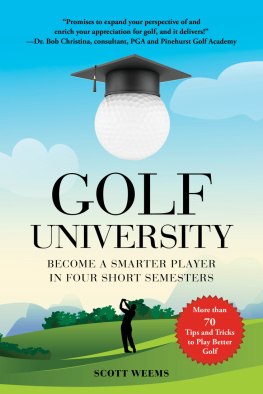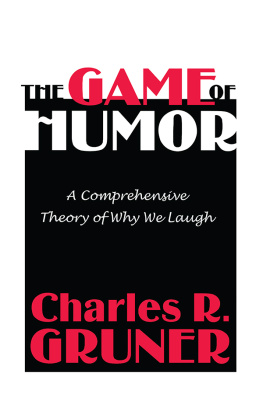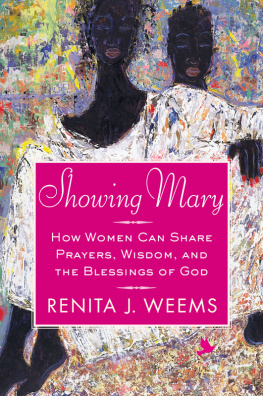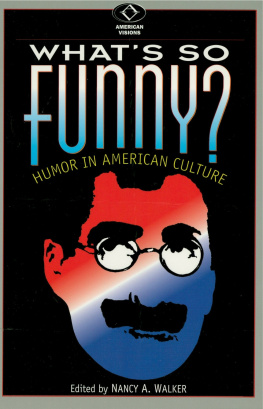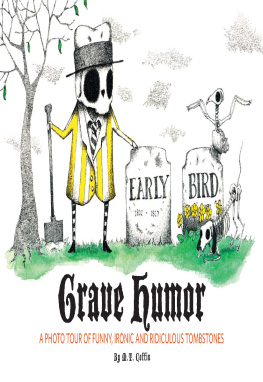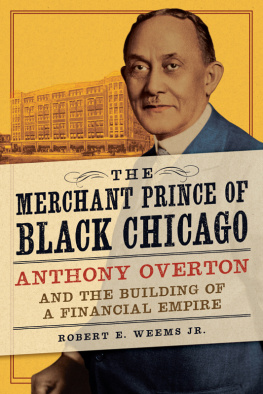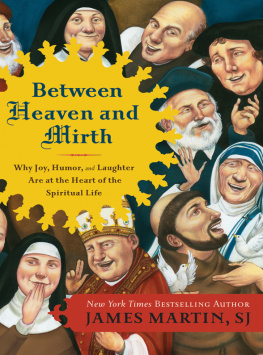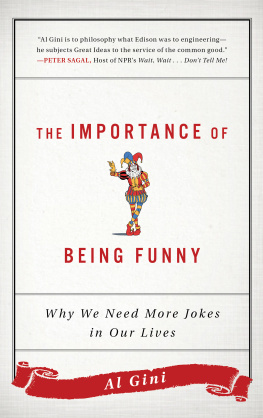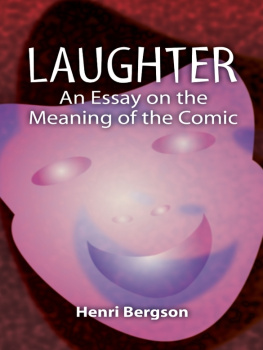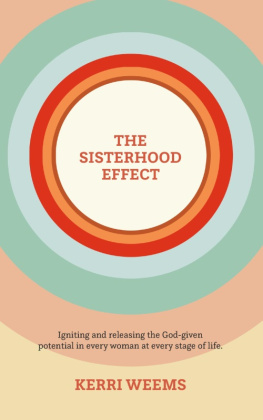HA!

Copyright 2014 by Scott Weems
Published by Basic Books,
A Member of the Perseus Books Group
All rights reserved. No part of this book may be reproduced in any manner whatsoever without written permission except in the case of brief quotations embodied in critical articles and reviews. For information, address Basic Books, 250 West 57th Street, 15th Floor, New York, NY 10107-1307.
Books published by Basic Books are available at special discounts for bulk purchases in the United States by corporations, institutions, and other organizations. For more information, please contact the Special Markets Department at the Perseus Books Group, 2300 Chestnut Street, Suite 200, Philadelphia, PA 19103, or call (800) 810-4145, ext. 5000, or e-mail .
Designed by Linda Mark
Library of Congress Cataloging-in-Publication Data
Weems, Scott.
Ha! : the science of when we laugh and why / Scott Weems.
pages cm
Includes bibliographical references and index.
ISBN 978-0-465-08080-9 (e-book) 1. Wit and humorTherapeutic use. 2. Wit and humor in medicine. 3. Laughter. I. Title.
R705.W43 2014
152.4'3dc23
2013046270
10 9 8 7 6 5 4 3 2 1
For Katherine Russell Rich, who laughed
CONTENTS
THE JOKE IS DEAD. IT EVEN HAD AN OBITUARY, WRITTEN BY Warren St. John and published in the New York Times on May 22, 2005. The joke died a lonely death, wrote St. John. There was no next of kin.
The setting was, as armchair poets call it, a dark and stormy night. New York City was being hit by almost twenty inches of snow, with wind gusts exceeding eighty miles an hour and temperatures dropping well below zero. The city was still recovering from an even bigger blizzard just two weeks before, and Mayor Robert Wagner had been forced to declare a state of emergency. Until the weather cleared and bulldozers could push the mess into the East River, New York was closed for business. At the same time, a young comic named Lenny Bruce waited in a hotel on West 47th Street, wondering if anybody would endure the terrible conditions to see his show. Cars werent even allowed on the roads, so what were the odds they would venture out into the city to see comedy?
It was midnight, February 4, 1961, the beginning of a prolonged death for the traditional joke. By the end of the night, Bruces career, and indeed comedy itself, would never again be the same.
Bruce had already made a name for himself by performing edgy stand-up routines based on race, religion, and sexual hypocrisy. He didnt tell jokes, and many people didnt find his stories especially funny. Instead, they were shocking, less like comedy and more like social commentary. Bruce wasnt a comedian like Bob Hope or Sid Caesar; his act had little structure and sounded distinctly unrehearsed. Just as jazz musicians hone their craft not by focusing on individual songs but by perfecting use of their instrument, Bruce was becoming master of the riff, the story, and the offhand remark. Carnegie Hall would be his master performance.
The show began with Bruce remarking on the size of the crowd, wondering what would happen if, instead of comedy, he simply performed an extended violin solo. Then his art began, and he ripped into a string of random observations and anecdotes that, if committed to print, would be incomprehensible. He pondered what would happen if Jesus and Moses visited St. Patricks Cathedral and saw the size of the cardinals ring. He wondered how, since the earth is constantly rotating, people who die at noon can go to heaven while those passing away in late evening dont go to hell. When feedback erupted over the microphone, he searched the stage looking for the source of the noise, musing how funny it would be if the speakers were simply picking up sound from a kid practicing piano behind the curtain. Like Charlie Parker with a saxophone, or Miles Davis a trumpet, he worked the microphone and improvised about anything that came to mind, drawing huge laughs despite telling almost no traditional jokes. Theres no right and wrong, he claimed early in the act. Just my right, and your wrong.
For the next two hours Bruce shared observations about religion, prejudice, and even women with hairy armpits, and though his approach wasnt groundbreaking, it was the first time anybody had performed with such fluidity. Like other comedians of his generation, he rejected the idea of setups and punch lines in favor of a more personal approach, trading one-liners for an angst-filled slurry of words that at times bordered on gibberish. He wasnt the funniest comic of his time. Far from itmuch of his humor was lost on the audience for the simple reason that he didnt bother finishing most of his sentences. He wasnt the smartest, either. Rather, he was simply the most creatively idiosyncratic, like the kid in school who could have been voted most likely to succeed if only he cared about the title. He was both a genius and a complete mess.
All laughter is involuntary, he said during the performance. Try to fake four laughs in an hour, itll take you away, man. You cant. They laugh because its funny. [Switch to stiff, formal voice] They have had the exposure in the area that he is satirizing. In other words, humor happens when we connect with other people and share their struggles and confusions. Indeed, on February 4, 1961, all laughter was involuntary.
Still, the exact moment of death, the jokes final death knell, didnt come until the conclusion of his act. Bruce announced that he wanted to end the performance with a traditional story, one with a regular setup and punch line. People would laugh and jump from the rafters, choral music would celebrate his joy, and his job would be so complete that there would be no need for a curtain call. The joke would be enough.
Nineteen minutes later he still hadnt gotten around to the punch line.
Though the joke eventually elicited huge laughs and applause, the reaction didnt come from the joke itself. That was relatively tame, involving a man sleeping on a plane with his fly open and his privates exposed. No, the audience erupted in huge applause because they recognized that something unusual had just happened. They had witnessed a new form of comedy.
A short while later, Bruce would be arrested for obscenity, and comics like George Carlin and Richard Pryor would take his place as humor pioneers, working up audiences in ways unknown to previous generations. Comedy would remain healthy as ever, though nobody would look at it the same way again.
Im not a comedian, Bruce said later. The world is sick and Im the doctor. Im a surgeon with a scalpel for false values. I dont have an act. I just talk. Im just Lenny Bruce.

Im too young to have ever seen Lenny Bruce perform live, but I love his work and it has often made me wonder: Why do we find things funny? Its a philosophical as well as scientific question: Why do some comments, including jokes, quips, or extended stories, provoke joy and laughter, while others do not? Or, to be more concrete, why do we have the same reaction to a quip made by Lenny Bruce as to one made by Henny Youngman? Youngman was the comic who spoke the immortal line Take my wife... please, the kind of one-liner thats now rare but in its day caused audiences to howl. Humor may have adapted to modern tastes, like other forms of entertainment, but this doesnt explain why something funny to one person isnt to another, or why something thats hilarious in one decade is trite and stale in another.
I believe the answer to these questions lies in the fact that humor is ultimately not about puns or one-liners. Although traditional jokes are now rare thanks to artists like Bruce, humor remains alive and well because its a process, one that reflects the times and needs of its audiences. Its the social or psychological working through of ideas that are not easily handled by our conscious minds.
Next page

